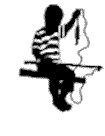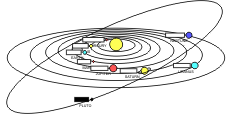Copyright © 1991 Richard R. Kennedy All rights reserved. Revised: 2006.
|
|
F i r s t C i t y - S t a t e
A hundred thousand years of science, mathematics and intra-solar system flight was the trademark of an ancient planet circling a star that hung on the fringe of a galaxy so distant that it actually scraped against the shell of space. Ultimately its inhabitants discovered that the space-time continuum was but an invention fashioned out of the limitations of their own perceptual mechanics. After mega-calculations and tedious conditioning, they were able to jump out of space and time at will and then choose any point in the physical universe.
Sixty million years ago in obsolescent time when the dinosaur roamed the corners of the earth, a great spaceship jumped back into a designated point in the continuum, spread out its immense retractable wings, swooped into the thick cosmic dust and landed on a rolling plain of rich soil, still millions of years from becoming a desert. For now, the relatively young earth─in non-geological terms─was everywhere still tropical from its boiling insides spewing steam and cleansing the murky atmosphere that had been trapping the heat for three and a half billion years.
By earth's measure of time in the context of human standards several weeks passed before there was any signs of activity from sleek ship's four hundred-foot swept-back wings that served as living quarters whether extended or retracted from the enormous cylindrical fuselage housing equipment and provisions, except for the saucer-like command tower set back and above the nose. Once adjusted to the new sense of gravity, the explorers ventured out in small groups to breathe in the new air and to test their agility to heavier gravity than they were used to. Each earth day the crew and passengers would step down and mill round the ship to take in more air until their space manager deduced from the ship's computers that the new inhabitants had safely adjusted to a natural state for this particular planet.
Ramps protruded from the belly of the ship, and an array of robotic construction-machinery emerged─some on steel belt-cleats, some on tires with deeply cut treads, others on talon-like feet─to begin the development of the very first city-state. These immense robots busied about as the great beasts of the era seemed to look on with curiosity while bathing in the river that cut through a terrain already beginning to show signs of large sand deposits. The larger dinosaurs even felt intimidated by these strange moving objects─never before having perceived anything mobile larger than themselves. But the most intimidating was the band of defensive warriors issuing from the ship. Equipped with an assortment of weapons, designed merely to make noise and flashing light, these exploring defenders harmlessly herded the mighty beasts away from the construction project.
Swiftly and methodically the robots sculpted smooth blocks from cosmic debris and volcanic rock deposited billions of years before and erected a forty-foot high wall, two thousand feet circumventing the spaceship while the settlers assisted by smaller robots began constructing shelters from materials unloaded from the ship.
An occasional brontosaurus, while dining off leaves of tall trees whose branches hung over the mighty wall, would peer over at the strange biped creatures who industriously yet with carefree mannerism would work among their robots whose larger counterparts were now busily clearing vegetation from along the river. No "earth" creature─the new arrivals labeled the planet Trinus─small or large had ever before witnessed a living, tail-less thing so proportionately erect and agile as these Trinians. Even the fearsome tyrannosaur, in spite of its incredible speed, could hardly produce with the ease of fish the twists, turns and spurts of energy, along with the incredible maneuverability of the upper limbs of these new arrivals of early "man."
So efficient were the new masters of Trinus that before the moon could complete its cycle, the settlement within the city wall was complete. The aliens─now fully aware that they were to be permanent natives─turned their attention to outside the wall where they began in unison with the smaller robots to farm the land while the defenders kept the native animals at a distance, rather than kill them, since seldom did the aliens have to hunt them down for food. Their computer in light of the reptiles' immensity estimated that one kill would suffice the settlers' protein for two cycles of the moon. Of course, there was sufficient processed nourishment aboard ship, but which would soon be returning to the home planet for another exploration assignment. Those left behind possessed the knowledge to produce the processed nourishment. However, in spite of the supracivilization to which they were accustomed, these Trinians would never lose the taste for natural foods as a matter of pride and celebration of life. Even before the major project for which they came began, giant silos were beginning to tower over the beds of the trickling stream.
This celebration ironically was in direct contrast to the profession that most of these adult settlers practiced and succeeding generations of Trinians would perpetuate for a million years until the coming of a great cosmic accident here would force these space creatures to take up residence elsewhere in an other young solar system like our own in order to perpetrate the dictum from their overcrowded home planet of agéd inhabitants. By that time, however, they would have grown so attached to Trinus that they would nostalgically intuit that their descendants thousands of generations beyond the coming cataclysm would return─consistent with their venturesome heritage─to restore Trinian intelligence to the hapless, brutish globe.
These pre-cataclysmic ancestors of human origin, in spite of their prevailing profession, had not lost touch with agrarian practice because it reminded them of the natural beauty in the cycles of life and therefore worked the new soil with gusto, knowing that soon most of them would no longer have the time to recreate in this time-honored activity of birth, generation and yield for harvest.
For, only the evening before, after having checked on the progress of the giant robots working by the now surging stream from the south, the space manager had assembled the unit heads of the profession to the freshly completed city-hall to announce that the first hearse ship was to arrive, whereupon they would be embalming the shipment from the old home before interring the remains in the first pyramid constructed along the young river.
Country Boy
 |
Not too long ago, about the time grandparents were children, a country boy of about thirteen after raking out farmer Swenson's barnyard, had just finished neatly laying fresh hay across the extensive pen. He retired to the barn and hung up the shovel, hook and rake. Mr. Swenson popped out from a stall, having unharnessed his hitch horse. He approached the boy and took out a worn-down fifty cent piece. "My cows won't know the yard when I bring'm in from the pasture after supper," the old, tired farmer said. "You did a fine job, Del...."
All of New Fantasies available on Lulu

